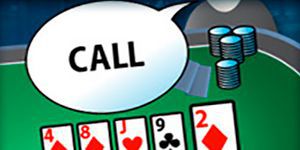Why you should rarely call in poker

Most newbie players are tentative when it comes to raising a hand, so they’ll invariably just call. But did you know that calling can be the worst play you could make at the poker table? In fact, just calling can lose you money in the long run whether by missing out on money you could have got by raising or calling too much with hands that will lose.
Let’s look at the four options you have in a hand and see how they stack up against each other:
Bet, Raise, Fold, Call
It may seem that these four plays in poker are equal - You can either bet, raise, fold or call. But, guess what? They’re not! There is a hierarchy of profitability of each of these poker play - depending on any given scenario - but the general rule is:
Betting/Raising is best; Folding is second best, and Calling is Worst!
Therefore, according to the above statement:
1 = Betting/Raising
2 = Folding
3 = Calling = WORST
Next, the question comes to mind - “Why is calling worst?”
Why Calling Is Worst
When you start out playing poker, calling seems like the least bad option when you’re in a tricky situation - when you’re clueless about what an opponent might be holding. However, by continuing down this path of just calling when you’re unsure of your position in a hand, you will run out of chips, quickly.
Folding can conserve chips in hands where you are most likely behind to be used raising opponents in hands where you are most likely ahead.
And, this is where newer players fail. When you think you’re ahead, you should be raising not just calling. Calling in situations where you are ahead will cost you in lost money. When you play a hand well and trap an opponent, don’t be afraid to make them pay by raising that river! It’s one of the best ways to extract more money in a hand.
On the other hand, when you call down too many pots with the loser, you’ll end up running through your bankroll quicker than you can say, Jack Robinson. So, the real test of not calling off your chips at the table is to pay attention to every micro-detail of your opponents’ actions. A hesitant or unnerved opponent could make the mistake of trying to string bet you.
By paying attention to all the action at the table, you’ll be better able to know when to bet/raise or fold. Leave the calling to those rare situations where pot odds dictate or when you just can’t fold your set to that river flush card.
Poker is a game of what you don’t put into the pot as much as it is what you do put into the pot.
By folding hands where you know you’re beat, you win.
By raising hands when you know you’re ahead, you win even more.
It’s all about Decisions
Poker is about making the right decisions. If you try to make better decisions than your opponents, you will win more often than not. Therefore, when you get players to make more decisions in tricky spots, they will occasionally get it wrong.
For example, if you call a player who bets - that’s it. It’s over. We move onto the next card, and their decision process for that street is complete. However, when you raise a player who bets the turn, for instance, now they have to make another decision. And, the more decisions they have to make, the more likely they are to make a mistake.
When you call, you let them off easy when you should be causing them pain by raising and betting - putting their hands to the test. Make them ask the questions, “How certain am I that I have the best?” or “Do I really want to take this hand to the river?”
By avoiding calling, you up the chances of getting that fold and reduce the chance that you’ll gradually bleed off all your chips with mediocre hands.
So, when you get the urge to reach for that call button, ask yourself if you should be raising or even folding here!
Knowledge base's sections
The best about poker
- How to get satisfaction from playing poker
The psychology of poker
- Five reasons why I've made money and continue doing this playing poker
The psychology of poker
- Poker table positions (positions in poker)
Fundamentals of poker
- The fundamental theorem of poker
Poker theorems
- Slow play in poker
Fundamentals of poker
- The probabilities of getting specific starting hands on preflop
Poker mathematics
 pokerglobal
pokerglobal
Comments (0)